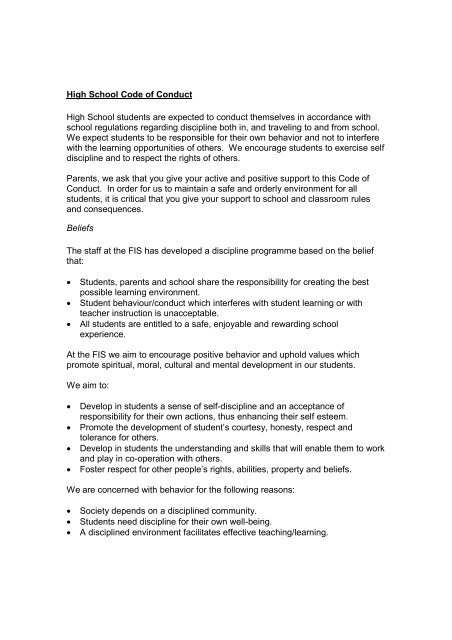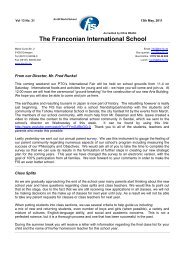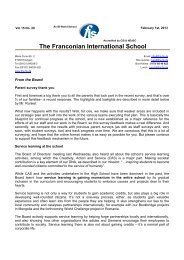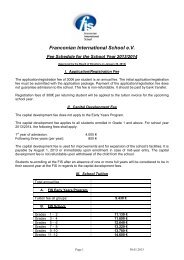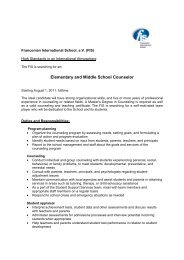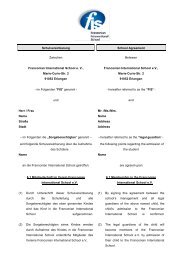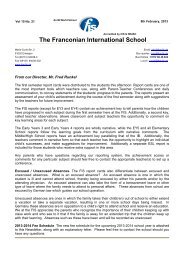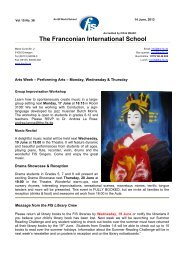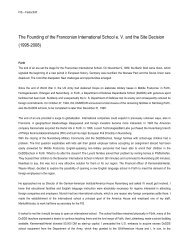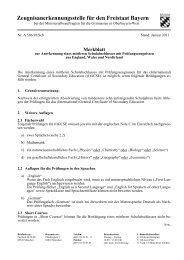FIS Code of Conduct - the Franconian International School
FIS Code of Conduct - the Franconian International School
FIS Code of Conduct - the Franconian International School
You also want an ePaper? Increase the reach of your titles
YUMPU automatically turns print PDFs into web optimized ePapers that Google loves.
High <strong>School</strong> <strong>Code</strong> <strong>of</strong> <strong>Conduct</strong><br />
High <strong>School</strong> students are expected to conduct <strong>the</strong>mselves in accordance with<br />
school regulations regarding discipline both in, and traveling to and from school.<br />
We expect students to be responsible for <strong>the</strong>ir own behavior and not to interfere<br />
with <strong>the</strong> learning opportunities <strong>of</strong> o<strong>the</strong>rs. We encourage students to exercise self<br />
discipline and to respect <strong>the</strong> rights <strong>of</strong> o<strong>the</strong>rs.<br />
Parents, we ask that you give your active and positive support to this <strong>Code</strong> <strong>of</strong><br />
<strong>Conduct</strong>. In order for us to maintain a safe and orderly environment for all<br />
students, it is critical that you give your support to school and classroom rules<br />
and consequences.<br />
Beliefs<br />
The staff at <strong>the</strong> <strong>FIS</strong> has developed a discipline programme based on <strong>the</strong> belief<br />
that:<br />
• Students, parents and school share <strong>the</strong> responsibility for creating <strong>the</strong> best<br />
possible learning environment.<br />
• Student behaviour/conduct which interferes with student learning or with<br />
teacher instruction is unacceptable.<br />
• All students are entitled to a safe, enjoyable and rewarding school<br />
experience.<br />
At <strong>the</strong> <strong>FIS</strong> we aim to encourage positive behavior and uphold values which<br />
promote spiritual, moral, cultural and mental development in our students.<br />
We aim to:<br />
• Develop in students a sense <strong>of</strong> self-discipline and an acceptance <strong>of</strong><br />
responsibility for <strong>the</strong>ir own actions, thus enhancing <strong>the</strong>ir self esteem.<br />
• Promote <strong>the</strong> development <strong>of</strong> student’s courtesy, honesty, respect and<br />
tolerance for o<strong>the</strong>rs.<br />
• Develop in students <strong>the</strong> understanding and skills that will enable <strong>the</strong>m to work<br />
and play in co-operation with o<strong>the</strong>rs.<br />
• Foster respect for o<strong>the</strong>r people’s rights, abilities, property and beliefs.<br />
We are concerned with behavior for <strong>the</strong> following reasons:<br />
• Society depends on a disciplined community.<br />
• Students need discipline for <strong>the</strong>ir own well-being.<br />
• A disciplined environment facilitates effective teaching/learning.
<strong>Code</strong> <strong>of</strong> Student Behaviour<br />
As <strong>the</strong> United Nations Committee on <strong>the</strong> Rights <strong>of</strong> <strong>the</strong> Child state in <strong>the</strong>ir General<br />
Comment No 1 on <strong>the</strong> aims <strong>of</strong> education:<br />
“Racism and related phenomena thrive where <strong>the</strong>re is ignorance, unfounded<br />
fears <strong>of</strong> racial, ethnic, religious, cultural and linguistic or o<strong>the</strong>r forms <strong>of</strong> difference,<br />
<strong>the</strong> exploitation <strong>of</strong> prejudices, or <strong>the</strong> teaching or dissemination <strong>of</strong> distorted<br />
values. A reliable and enduring antidote to all <strong>of</strong> <strong>the</strong>se failings is <strong>the</strong> provision <strong>of</strong><br />
education which promotes an understanding and appreciation <strong>of</strong> <strong>the</strong> values<br />
reflected in article 29 (1)2, including respect for differences, and challenges all<br />
aspects <strong>of</strong> discrimination and prejudice”.<br />
Education remains at <strong>the</strong> heart <strong>of</strong> promoting anti-racism, both from <strong>the</strong><br />
perspective <strong>of</strong> fostering intercultural societies respectful <strong>of</strong> difference, and in<br />
addressing <strong>the</strong> legacy <strong>of</strong> disadvantage and discrimination experienced by ethnic<br />
and religious minorities in society today. The <strong>FIS</strong> is prepared to meet this need<br />
and to be able to demonstrate inclusion and equity in <strong>the</strong> process and content <strong>of</strong><br />
its educational system. The <strong>FIS</strong> school community (students, staff and parents)<br />
gives unconditionally support to <strong>the</strong> maintenance <strong>of</strong> an inclusive learning<br />
environment. Students, parents and teachers, each in <strong>the</strong>ir own way, must<br />
contribute effectively to <strong>the</strong> prevention and elimination <strong>of</strong> racism, ethnic<br />
discrimination, xenophobia and related intolerance.<br />
It is our belief that <strong>the</strong> students and staff at <strong>the</strong> <strong>FIS</strong> have <strong>the</strong> right to a safe and<br />
friendly environment that fosters respect for each o<strong>the</strong>r and is free from verbal<br />
and physical aggression.<br />
Unacceptable behaviour includes but is not limited to <strong>the</strong> following:<br />
Harassment: Malicious<br />
Definition: Harassing ano<strong>the</strong>r person because <strong>of</strong> that person’s race, religion,<br />
colour, gender, age, national or ethnic origin, disability, political beliefs, martial<br />
status, sexual orientation, or social and family background. Such harassment<br />
may include any slurs, innuendoes, or o<strong>the</strong>r verbal or physical conduct reflecting<br />
on an individual’s race, religion, colour, gender, age, national or ethnic origin,<br />
disability, political beliefs, martial status, sexual orientation, or social and family<br />
background which has <strong>the</strong> purpose <strong>of</strong> effect <strong>of</strong> creating an intimidating, hostile, or<br />
<strong>of</strong>fensive educational or work environment; has <strong>the</strong> purpose <strong>of</strong> effect <strong>of</strong><br />
unreasonably interfering with <strong>the</strong> individual’s work environment; has <strong>the</strong> purpose<br />
<strong>of</strong> effect <strong>of</strong> unreasonably interfering with <strong>the</strong> individual’s work or school<br />
performance or participation; or o<strong>the</strong>rwise adversely affects an individual’s<br />
educational opportunity. Such harassment is prohibited on school grounds, on<br />
school transportation, during school sponsored activities/events/field trips, or
through <strong>the</strong> use <strong>of</strong> data or computer s<strong>of</strong>tware that is accessed through a<br />
computer, computer system, or computer network at <strong>the</strong> <strong>FIS</strong>.<br />
Students have a responsibility to promptly report any occurrence <strong>of</strong> harassment.<br />
Consequences:<br />
1. Out <strong>of</strong> school suspension from school in accordance with <strong>the</strong> High<br />
<strong>School</strong> <strong>Code</strong> <strong>of</strong> <strong>Conduct</strong><br />
2. Notification <strong>of</strong> parents/guardians in accordance with <strong>the</strong> High <strong>School</strong><br />
<strong>Code</strong> <strong>of</strong> <strong>Conduct</strong><br />
3. The victim or <strong>the</strong> parent/guardian <strong>of</strong> <strong>the</strong> victim, if such is a student, will<br />
be given notification <strong>of</strong> <strong>the</strong> opportunity to speak to <strong>the</strong> school<br />
authorities regarding <strong>the</strong> pursuit <strong>of</strong> criminal charges against <strong>the</strong><br />
perpetrator.<br />
Harassment: Sexual<br />
Definition: Undesired sexual behaviour towards ano<strong>the</strong>r; unwanted or repeated<br />
verbal or physical sexual behaviour that is <strong>of</strong>fensive and objectionable to <strong>the</strong><br />
recipient, causes discomfort or humiliation, or creates a hostile environment. The<br />
following type <strong>of</strong> conduct by any adult or student constitutes sexual harassment:<br />
creating a hostile environment with sexually harassing conduct which can include<br />
unwelcome sexual advances; or o<strong>the</strong>r verbal, nonverbal or physical behaviour <strong>of</strong><br />
a sexual nature that is sufficiently severe, persistent, or pervasive enough to<br />
create a hostile or abusive educational environment.<br />
Students have a responsibility to promptly report any occurrence <strong>of</strong> harassment.<br />
Complaints should be direct to <strong>the</strong> HS Principal, stating <strong>the</strong> act(s), state <strong>the</strong><br />
date(s), state <strong>the</strong> name(s) <strong>of</strong> witnesses. Investigations will be conducted with<br />
discretion. The right to confidentiality, both <strong>of</strong> <strong>the</strong> complainant and <strong>of</strong> <strong>the</strong><br />
accused, with respect to legal obligations and with <strong>the</strong> necessity to investigation<br />
<strong>the</strong> allegations. Claims found to be factually supported will be promptly acted<br />
upon.<br />
Consequences:<br />
1. Violation <strong>of</strong> <strong>the</strong> sexual harassment policy by a student is grounds for<br />
disciplinary action up to and including expulsion and may result in<br />
criminal penalties being imposed.
Harassment: Bullying<br />
Definition: Bullying is a form <strong>of</strong> aggression, and it occurs when a person(s)<br />
wilfully subjects ano<strong>the</strong>r person (victim), to an intentional, unwanted and<br />
unprovoked, hurtful verbal and/or physical action(s) at any school site or schoolsponsored<br />
activity or event. Bullying may also occur as various forms <strong>of</strong> hazing,<br />
including initiation rites perpetrated against a student or a member <strong>of</strong> a team.<br />
Examples <strong>of</strong> types <strong>of</strong> bullying may include, but are not limited to, <strong>the</strong> following<br />
examples.<br />
• Physical bullying includes, but is not limited to, punching, shoving, poking,<br />
strangling, hair pulling, beating, teasing, kicking, punching, or excessive<br />
tickling.<br />
• Verbal bullying includes, but is not limited to, such acts as malicious name<br />
calling, teasing, or gossip.<br />
• Emotional (psychological) bullying includes, but is not limited to, rejecting,<br />
wronging, extorting, defaming, humiliating, black-mailing, diminishing<br />
personal characteristics (such as race, disability, ethnicity or perceived<br />
sexual orientation), manipulating friendships, isolating, or ostracizing.<br />
• Sexual bullying includes, but is not limited to, many <strong>of</strong> <strong>the</strong> actions<br />
preceding as well as exhibitionism, voyeurism, sexual propositioning,<br />
abuse involving actual physical contact, or sexual assault.<br />
• Cyber-bullying includes web-based bullying or bullying using any form <strong>of</strong><br />
electronic media.<br />
Personnel at all levels are responsible for taking corrective action to prevent<br />
bullying at any school sites or activities. Allegations <strong>of</strong> bullying will be promptly<br />
investigated, giving due regard to <strong>the</strong> need for confidentiality and <strong>the</strong> safety <strong>of</strong><br />
<strong>the</strong> alleged victim and/or any individual(s) who report incident(s) <strong>of</strong> bullying. An<br />
individual has <strong>the</strong> right to report an incident(s) <strong>of</strong> bullying without fear <strong>of</strong> reprisal<br />
or retaliation at any time. Retaliation is defined as meaning "to pay back (an<br />
injury) in kind." When a person is accused <strong>of</strong> having behaved in an inappropriate<br />
fashion, especially bullying, <strong>the</strong> common reaction <strong>of</strong> that person is to be angry<br />
and want to pay <strong>the</strong> "alleged victim" back (retaliate). Retaliation must not occur<br />
and will not be tolerated.<br />
Victims <strong>of</strong> bullying have responsibilities. Victims should clearly tell <strong>the</strong> bullies to<br />
stop. If bullying persists, victims should not ignore <strong>the</strong> incident(s) but should<br />
report immediately <strong>the</strong> incident to someone at school. Students should tell <strong>the</strong>ir<br />
parent(s). If <strong>the</strong> bullying continues after having clearly told <strong>the</strong> bullies to stop,<br />
students should make a written record <strong>of</strong> <strong>the</strong> incident including dates, times,<br />
witness or witnesses, and parties involved in <strong>the</strong> incident. The incident should be<br />
reported immediately to an adult who has authority over <strong>the</strong> bullies, for example,<br />
a teacher, guidance counsellor, assistant principal, or principal. Victims should<br />
avoid being alone with <strong>the</strong> person(s) who attempted to bully <strong>the</strong>m in <strong>the</strong> past.
Victims <strong>of</strong> bullying who feel uncomfortable reporting this fact to adult personnel at<br />
school should contact ano<strong>the</strong>r appropriate adult or friend who will report on <strong>the</strong>ir<br />
behalf.<br />
To minimize <strong>the</strong> risk <strong>of</strong> being accused <strong>of</strong> bullying, students should keep <strong>the</strong>ir<br />
hands to <strong>the</strong>mselves, remember that no one has <strong>the</strong> right to harm ano<strong>the</strong>r<br />
person in any way, think before speaking, immediately apologize for accidentally<br />
saying or doing anything that has made ano<strong>the</strong>r person feel oppressed, and<br />
report all incidents <strong>of</strong> bullying behaviour <strong>the</strong>y have witnessed to appropriate<br />
school personnel. Students should not touch anyone without his or her<br />
permission. Students should not interact with a person after that person has<br />
perceived <strong>the</strong>ir behaviour toward <strong>the</strong>m as "inappropriate" and has clearly told<br />
<strong>the</strong>m to "stop". Nor should <strong>the</strong>y make remarks that may cause ano<strong>the</strong>r person to<br />
feel "oppressed" (stressful, scared, intimidated).<br />
Consequences<br />
Proven allegations <strong>of</strong> bullying can have serious consequences for <strong>the</strong> person<br />
deemed guilty, including verbal or written reprimand, in-school or out-<strong>of</strong>-school<br />
suspension, and/or expulsion.<br />
Physical aggression/fighting<br />
• One or more students using violence towards ano<strong>the</strong>r person<br />
• Two or more students using violence towards each o<strong>the</strong>r<br />
Dangerous behaviour<br />
• Acting in a manner that can cause injury and/or harm to oneself or o<strong>the</strong>rs, i.e.<br />
play fighting, throwing objects.<br />
• Harmful objects and substances (including drugs and objects according to <strong>the</strong><br />
German Drug Act (Betaeubungsmittelgesetz) and <strong>the</strong> <strong>FIS</strong>`s Tobacco, Drug,<br />
Alcohol and Weapons Policy).<br />
• Bringing harmful substances or objects onto school premises.<br />
• Being at school under <strong>the</strong> influence <strong>of</strong> drugs and/or alcohol (refer to <strong>the</strong> <strong>FIS</strong>`s<br />
Tobacco, Drug, Alcohol and Weapons Policy).<br />
• Stealing and taking something without <strong>the</strong> owners consent<br />
• Damaging school property<br />
• Misusing, defacing or destroying school property and\or or o<strong>the</strong>r people’s<br />
belongings
Intimidation<br />
• Use <strong>of</strong> pr<strong>of</strong>anity.<br />
• Swearing, rude and vulgar language and gestures.<br />
• Disrespect towards members <strong>of</strong> staff and /or o<strong>the</strong>r students. Includes verbal,<br />
visual, or physical harassment by an individual or group.<br />
• Defiant behavior towards an adult (ignoring walking away, using a rude tone<br />
<strong>of</strong> voice)<br />
• Sexual, racial, cultural discrimination or insensitivity.<br />
Academic honesty<br />
• Direct and indirect forms <strong>of</strong> plagiarism (refer to <strong>the</strong> section on plagiarism<br />
and <strong>the</strong> IB guidelines on plagiarism).<br />
• Malpractice in school and external (IGCSE, PSAT, ACT, SAT and IB)<br />
examinations.<br />
Consequences/Disciplinary Action<br />
When inappropriate or unacceptable behavior does occur, students must expect<br />
to face <strong>the</strong> consequences <strong>of</strong> <strong>the</strong>ir actions. The purpose <strong>of</strong> <strong>the</strong> disciplinary<br />
procedure is threefold:<br />
1. To make <strong>the</strong> individual aware <strong>of</strong> <strong>the</strong> fact that <strong>the</strong>y are responsible for <strong>the</strong>ir<br />
behavior.<br />
2. To serve as a deterrent <strong>the</strong>reby protecting students from <strong>the</strong> negative<br />
actions <strong>of</strong> o<strong>the</strong>rs.<br />
3. To help <strong>the</strong> student make a genuine effort to modify his/her behavior.<br />
Consequences and disciplinary actions include:<br />
• Informal student conference with teacher.<br />
• Temporary withdrawal <strong>of</strong> privileges.<br />
• Formal student conference with teacher.<br />
• Parent contact by phone.<br />
• Parent/Teacher/High <strong>School</strong> Principal conference.<br />
• Formal student conference with <strong>the</strong> High <strong>School</strong> Principal.<br />
• Exclusion from class. When a student’s conduct/behavior warrants exclusion<br />
from class he/she will be sent to <strong>the</strong> High <strong>School</strong> Principal (or ano<strong>the</strong>r<br />
teacher when <strong>the</strong> Principal is unavailable). This will be followed up with a<br />
conference with <strong>the</strong> Principal and a letter home to parents. Such exclusions<br />
will be recorded as an unexcused absence. As attendance is closely linked
to graduation requirements 1 , students whose unruly behavior continually<br />
warrants <strong>the</strong>ir exclusion from class will be putting <strong>the</strong>ir graduation at serious<br />
risk.<br />
• Written notification to parents.<br />
• Parent/Teacher/Director conference.<br />
• Removal <strong>of</strong> privileges.<br />
• Detention (Wednesday after school for one hour). Students who travel by<br />
school bus will have to make alternative arrangements. The High <strong>School</strong><br />
Principal will inform parents in advance when a student will be serving a<br />
detention.<br />
• Temporary suspension (this could include in-house suspension). This will be<br />
recorded as an unexcused absence.<br />
• Expulsion.<br />
• Notification <strong>of</strong> authorities.<br />
Although every effort will be made to apply <strong>the</strong> disciplinary procedure in a<br />
uniform manner, <strong>the</strong> nature <strong>of</strong> <strong>the</strong> punishment must, to some extent, be codetermined<br />
by <strong>the</strong> kind <strong>of</strong> child/children involved and <strong>the</strong> severity <strong>of</strong> <strong>the</strong> behavior.<br />
The High <strong>School</strong> Coordinator and Director will be ultimately responsible for <strong>the</strong><br />
progression <strong>of</strong> <strong>the</strong> disciplinary actions (timeframe, etc.) applied in each individual<br />
case.<br />
Management <strong>of</strong> Positive Behavior<br />
Considerate behavior is expected at all times and this is embodied in <strong>the</strong><br />
following school rules:<br />
• Follow <strong>the</strong> teacher’s instructions <strong>the</strong> first time.<br />
• Put your hand up when you want to speak.<br />
• Listen when o<strong>the</strong>rs are speaking.<br />
• Be kind - do not hurt o<strong>the</strong>rs with hands, feet, objects or words.<br />
• Be safe - use equipment sensibly and carefully and walk around<br />
school.<br />
• Be tidy - put things away carefully after you have used <strong>the</strong>m.<br />
• Be respectful - treat o<strong>the</strong>rs <strong>the</strong> way you would like to be treated.<br />
1 Along with successful completion <strong>of</strong> <strong>the</strong> course requirements, <strong>the</strong> <strong>FIS</strong> insists that students should be<br />
attending, as a minimum, 80% <strong>of</strong> <strong>the</strong> classes in <strong>the</strong>ir respective subjects. Refer to <strong>the</strong> <strong>FIS</strong>’s Policy on<br />
Attendance.
As a school we believe that students respond positively to encouragement,<br />
praise and recognition <strong>of</strong> good work by <strong>the</strong>ir peers and by <strong>the</strong>ir teachers. At <strong>the</strong><br />
<strong>FIS</strong> we reinforce high standards <strong>of</strong> conduct, achievement and effort not only by<br />
acknowledging <strong>the</strong>m in <strong>the</strong> classroom but also in a more formal manner through<br />
<strong>the</strong> following rewards/awards in different school sections:<br />
Positive Reinforcement <strong>of</strong> Good Behaviour<br />
As a school we believe that students respond positively to encouragement,<br />
praise and recognition <strong>of</strong> good work by <strong>the</strong>ir peers and by <strong>the</strong>ir teachers. At <strong>the</strong><br />
<strong>FIS</strong> we reinforce high standards <strong>of</strong> conduct, achievement and effort not only by<br />
acknowledging <strong>the</strong>m in <strong>the</strong> classroom but also in a more formal manner through<br />
<strong>the</strong> following rewards/awards in different school sections:<br />
• Best pieces <strong>of</strong> work on display<br />
• Project displays<br />
• Assemblies<br />
• End <strong>of</strong> Year Awards/Plaques:<br />
o CIS <strong>International</strong> Student Award<br />
This certificate is presented to a student or group <strong>of</strong> students<br />
in recognition <strong>of</strong> his/her/<strong>the</strong>ir contribution to <strong>the</strong> development<br />
and advancement <strong>of</strong> internationalism in <strong>the</strong> community.<br />
The student(s) must have demonstrated a clear commitment<br />
to sustained interaction with students <strong>of</strong> <strong>the</strong> o<strong>the</strong>r<br />
nationalities, languages or ethnic backgrounds in a spirit <strong>of</strong><br />
international understanding and cooperation.<br />
The student may be a part <strong>of</strong> a group but only one certificate<br />
will be awarded per group.<br />
Projects should encompass efforts directed beyond<br />
participation in regular school activities.<br />
The characteristics <strong>of</strong> projects may include whe<strong>the</strong>r <strong>the</strong>y<br />
represent individual or group efforts to:<br />
• Creatively solve known or emerging problems<br />
• Acquire and effectively deploy knowledge or resources<br />
beyond those immediately available in <strong>the</strong> school<br />
• Directly involve peoples <strong>of</strong> o<strong>the</strong>r cultures and ethnic<br />
backgrounds, and political/economic systems. The<br />
student(s) must have made a genuine commitment to<br />
initiate, sustain and complete <strong>the</strong> project or activity. <strong>School</strong>s<br />
are encouraged to nominate students who have<br />
demonstrated a commitment to using languages o<strong>the</strong>r than<br />
<strong>the</strong>ir own mo<strong>the</strong>r tongue during <strong>the</strong> completion <strong>of</strong> <strong>the</strong> project.
o Manfred Langer Memorial Award<br />
Awarded annually to celebrate <strong>the</strong> life and contributions to<br />
<strong>the</strong> <strong>FIS</strong> <strong>of</strong> former Hausmeister and friend Manfred Langer.<br />
This award is presented to a <strong>FIS</strong> student who is especially<br />
caring and helpful to those around him/her. The student<br />
shows <strong>the</strong> willingness to support classmates and teachers,<br />
and comes to <strong>the</strong> assistance <strong>of</strong> o<strong>the</strong>rs without being asked.<br />
In this way he/she exemplifies <strong>the</strong> qualities <strong>of</strong> Manfred<br />
Langer, who was truly a friend to our school in <strong>the</strong> early<br />
years.


